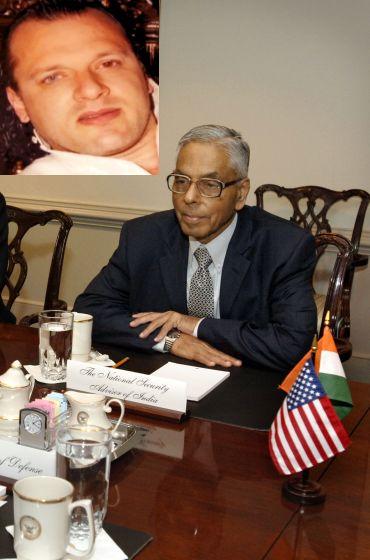
Rediff.com brings you for the second in the series of leaked Wiki cables, which point towards some startling revelations. Part I: Wikileaks: Did India support Pakistani Taliban?
Not keen on Headley's extradition, Govt told US?
Even as India was publicly pressing for Lashkar operative David Headley's extradition from the US, then National Security Advisor M K Narayanan had suggested to the American Ambassador in December 2009 that government was actually not keen on it but wanted to be seen doing so.
According to Wikileaks, in a cable to the US State Department on December 17, 2009, then ambassador Timothy J Roemer said that Narayanan had told him on the issue of Headley's extradition that it was "difficult not to be seen making the effort," but that the government was not seeking extradition "at this time."
In the leaked cable, where Roemer was seeking New Delhi's commitment to not request Headley's extradition, Narayanan said the Indian Government would be "in the hot seat" if it were seen as pre-emptively relinquishing extradition of one of the main accused of the 26/11 attacks.
"He (Roemer) explained that the threat of extradition to India could cause Headley's cooperation to dry up, but that allowing the US judicial process to unfold or securing a
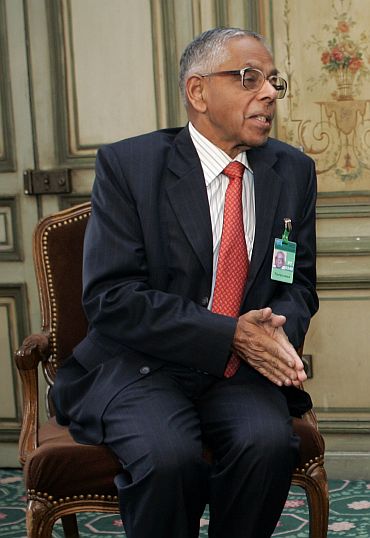
The exit of M K Narayanan as the National Security Adviser in January 2010 was seen as a "positive" development by the US which considered his view on Kashmir as "obstructionist".
In a cable to the US State Department, then American Ambassador Timothy Roemer said that India's Kashmir policy became "more consolidated" under the "more forward leaning Home Minister P Chidambaram".
At the outset, Roemer mentions that Narayanan's exit was a "plus side" as he played a "dominant, conservative and often obstructive role in GoI policy on Kashmir".
"The exit of M K Narayanan from the National Security Advisor position in the Prime Minister's Office has potentially important implications for India policy on Kashmir," he observed in a cable on February 1, last year.
"Narayanan cast a huge shadow over decision-making on internal security issues and, due to his intelligence and security background as well as his ties to the Nehru-Gandhi family, he seldom lost a bureaucratic or policy battle," the US envoy wrote back to Washington.
"Narayanan's natural instinct on Kashmir (and Pakistan) was cautious, conservative, and obstructionist," Roemer said.
"In the last six months, he (Chidambaram) has shown that he is willing to be a risk-taker on this intractable issue," Roemer said.
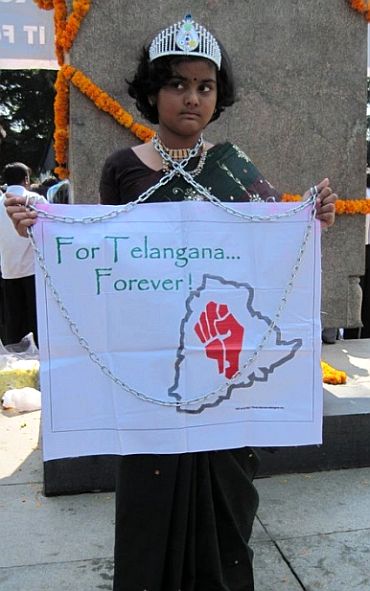
By 'surrendering' to the Telangana statehood demand, the Congress opened a can of worms and came across as a party that appeared "weak and feeble" and one that can be "easily bullied and intimidated by threats", according to US assessment of the situation in 2009.
In a secret cable written on December 10, 2009, then US Ambassador to India Timothy Roemer said the ramifications of the "Telangana surrender" may go beyond Andhra Pradesh as similar demands that were simmering are likely to get a fresh impetus from the Telangana movement's "overnight success".
Writing the cable a day after Home Minister P Chidambaram announced the formation of a Telangana state, Roemer said the Congress is likely to be faced with a floodgate of similar demands from other statehood movements across the country and the decision has created a split within its own party.
"...it appears to come across as weak and feeble, a party that can be easily bullied and intimidated by threats just six month after winning a decisive electoral mandate," the cable, which has now been released by WikiLeaks, said.
The cable also said that the Indian Government "abruptly caved" on December 9 and gave the go-ahead for formation of Telangana on the 11th day of Rao's hunger strike.

The US Embassy in New Delhi had cautioned its government against any "activism" in Kashmir saying even a hint of it can prove counter-productive in view of India's hypersensitivity to third party involvement on the issue, according to a leaked US diplomatic cable.
"Any hint of USG (United States Government) activism in Kashmir, however helpful the intentions behind it, will prove counterproductive because of the GOI's (Government of India) hypersensitivity to third party involvement in Kashmir," the US Ambassador to India, Timothy Roemer, had said in a secret cable to Washington in 2009.
"In order for the GOI's efforts to restore sustainable peace and stability in Kashmir to succeed, its engagement with the separatists and with the Kashmiri people must be free of any perception of outside influence," the ambassador said.
Roemer had outlined a slew of measures that Indian government should take to make forward movement on resolution of Kashmir issue, particularly the internal dimensions, but warned against making these "prescriptive" in nature.
In the list of 20 suggestions, he had said that the Centre should ensure that dialogue with separatists achieves results and the generous development spending in Jammu and Kashmir should continue.
Roemer noted that over the years both the practice of rearresting militants after courts ordering their release and use of PSA had decreased, but said the practices had not been eliminated.
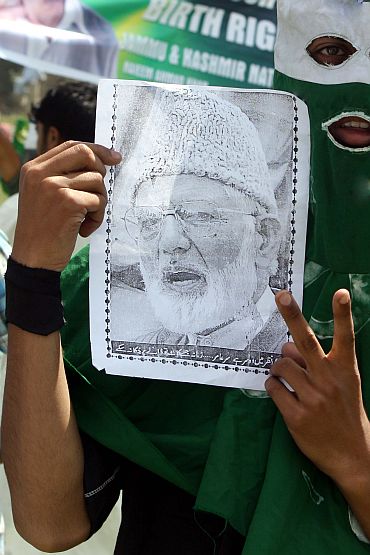
The turf war between rival factions of the Hurriyat Conference had reached a point where moderate leader Mirwaiz Umar Farooq counseled against issuing a passport to hardliner Syed Ali Shah Geelani for seeking treatment in the United States saying he would "stir up trouble", according to American diplomatic cables released by WikiLeaks.
"When we met Mirwaiz in February, he said it would be a big mistake for the GOI (Government of India) to issue Geelani a passport to travel, because he would stir up trouble," a March 2007 US embassy cable released by WikiLeaks said.
The cable with a subject title "Kashmiri rejectionist hardliner Geelani seeks US visa" was written by Geoffrey Pyatt -- apparently the then US Charge d'Affaires.
Geelani had applied for a visa to travel to the US for medical treatment for cancer in his remaining kidney. The US had later denied visa to Geelani.
While making a cost-benefit analysis of issuing a visa, the US official had believed Geelani's travel to their country will "physically" take him out of the political picture in India.
"Mirwaiz will not have Geelani breathing down his neck in a delicate political moment in the Valley," the diplomatic cable said referring to the Indo-Pak dialogue process which was believed to have thrashed out a solution to Kashmir issue.
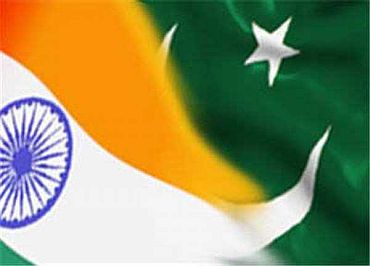
India and Pakistan had reached a "back-channel" agreement on the Kashmir issue during the tenure of Pakistan President Pervez Musharraf, Prime Minister Manmohan Singh had told a visiting US Congressional team.
According to secret US embassy cables released by WikiLeaks, Dr Singh told the Congressional delegation in April 2009 that India and Pakistan had made great progress prior to February 2007, when Musharraf ran into trouble.
"We had reached an understanding in back channels," Dr Singh told the delegation.
The cable was sent by US Charge d'Affairs Peter Burleigh to his bosses in the US State Department on April 21, 2009.
Dr Singh told the delegation that Musharraf had agreed to a non-territorial solution to Kashmir that included freedom of movement and trade, the cable said.
The Prime Minister added that India wants a strong, stable, peaceful, democratic Pakistan and makes no claim on "even an inch" of Pakistani territory, it said.
Pakistan, on the other hand, supports infiltrators, hoping "by a thousand cuts" to weaken Indian solidarity, the cable quoted Dr Singh as saying.